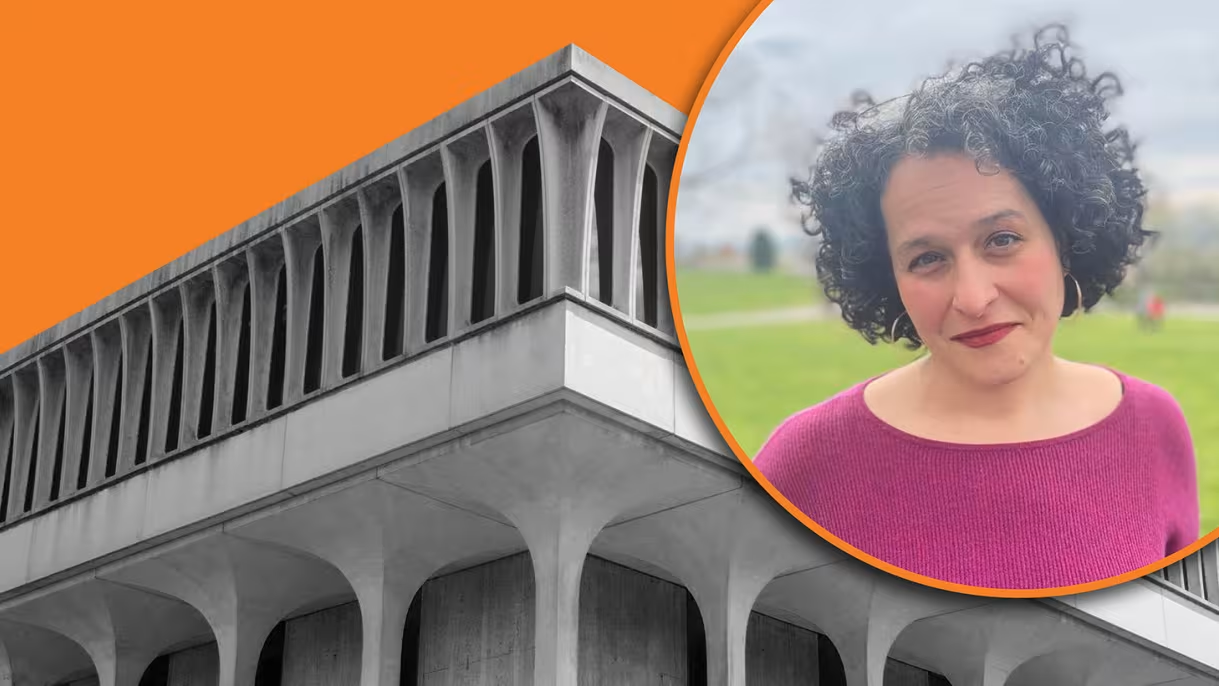

Fill in the Blanks with Amelia Frank-Vitale
Amelia Frank-Vitale may be a new face at the Princeton School of Public and International Affairs, but she’s feeling at home in her office at Aaron Burr Hall. Frank-Vitale, who has a joint appointment as assistant professor with the School and the Department of Anthropology, was a postdoctoral research associate and lecturer in Princeton’s Program in Latin American Studies, just a few floors above where she sits now, from 2021 to 2023.
Frank-Vitale returned to Princeton University from Barnard College this fall, and she says she could not have dreamt up a more ideal role for herself. Here’s more about that, in her own words:
My research explores… the long-reaching effects of the changing border policies of the United States, especially as we have externalized our border policies to Mexico and pushed migration controls further and further south from the actual boundary. What that has meant for people who are trying to escape situations of violence or grinding poverty, or very often both, is that they're detained and deported a few weeks or months after leaving their home. They're sent back to places that they tried to flee because they did not feel safe or see a future for themselves. So, they try again and again and again. The book I am writing is about how young people, and Hondurans in particular, navigate this changing terrain of immigration control, detention, and deportation.
Princeton SPIA is interesting to me… because my work is very anthropological and based in the rich, fine-grained ethnographic detail of being present in people's lives in a long-term, sustained kind of way. Too often, I think that that kind of ethnographic richness doesn't get translated to the world of policymaking. It’s wonderful that Princeton SPIA was excited about having an anthropologist join the faculty, to be able to shape people who are working on policy and to have interventions in policy arenas.
The slow research that anthropologists do can inform how policymakers think about interventions and long-term political choices. For example, I've spoken to people engaged in migration who employ people smugglers. From their perspective, these facilitators are not coercing or convincing people to migrate. Yet a lot of policy interventions are designed around getting people to not trust smugglers. The United States runs ad campaigns and educational programming in schools about the dangers of smugglers. That's a real mismatch from what a smuggler really does represent for people, which is making an unpredictable and dangerous process feel safer.
People smuggling is not the point of policy intervention that's going to change whether people migrate. Instead, one point is offering robust public primary education. It's hard to expect people to imagine a future in Honduras when they can't even count on their country to provide children with basic education.
At SPIA, I hope to… finish my book and build on that in future projects. I'm teaching a class where my students study the system of international protection and U.S. immigration and asylum law, and then work with an organization in New York City on asylum cases. I would like to turn that into something more ongoing – a yearlong class or a clinic where students engage in asylum adjudication processes from beginning to end.
I'd also love to develop an ongoing project, maybe in immigration court in Philadelphia, where I have a sustained presence with my students in immigration court and we develop an ongoing research project around documenting what happens there. For people who are interested in immigration policy, understanding what's happening in these courtrooms is an important window into how policy affects people.
If I weren’t in academia, I would be… doing community-rooted work. I used to be a union organizer, and I did immigrants’ rights work. There are many points in my life where I might have gone that other direction. I love teaching, and that's one of the things I'm so excited about being here.
The people most influential in my career have been… Patricia Pessar and David Graeber, two wonderful mentors when I was an undergraduate who have both since passed away. I respected the work of both these anthropologists and the way they connected it to larger things going on in the world. That put in the back of my mind the possibility that being a professor could be something that I might want to do. And then the anthropologist who was my dissertation advisor at Michigan, Jason De León. He is the model for me of how to be a teacher, a mentor, a researcher, a writer.
On a Saturday night in Princeton, you’ll most likely find me… in my house with my husband having a bottle of wine. I'm enjoying the slowness of this community compared to the hustle and bustle of New York City. It's very conducive to thinking and reading and writing.
My secret talent is… an excellent sense of direction. I have a friend who said that it was my superpower, that I was like a homing pigeon. You could drop me off anywhere, and I could always find my way back.

